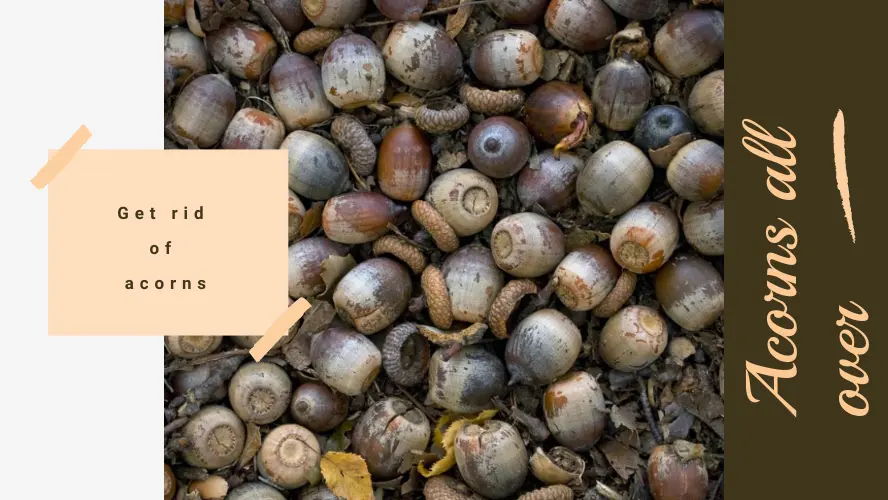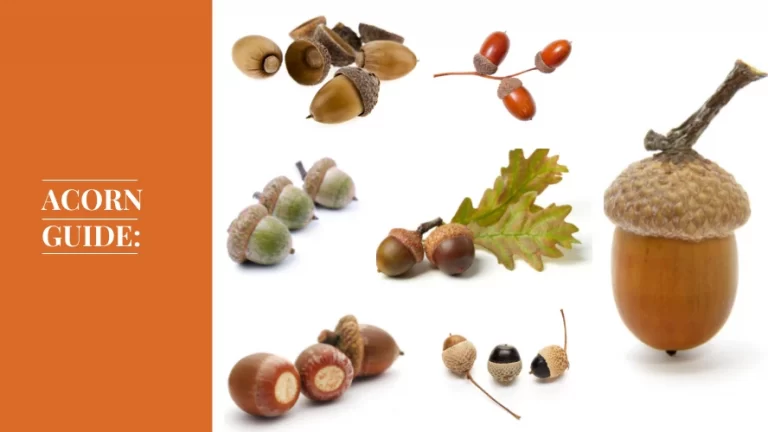Managing Excessive Acorns: Disposal and Utilization Methods

Many homeowners face a challenging task every autumn: managing the abundance of fallen acorns in their yards. These acorns typically come from various oak trees, such as the Red Oak, White Oak, and Pin Oak.
While acorns are a natural part of the ecosystem, an excessive accumulation can damage lawns, create safety hazards, and attract unwanted wildlife. Addressing this concern requires thoughtful and effective strategies.
We will explore some solutions to help you tackle the acorn dilemma. From efficient removal methods to innovative and environmentally friendly uses, we cover a variety of approaches.
Understanding the Impact of Acorns on Your Yard
Acorns are more than just a sign of autumn; they can significantly impact your yard and environment. When falling in excess, they create several challenges:
- Lawn Health: A dense layer of acorns can suffocate grass and other ground cover. This hinders growth and leads to patchy and uneven lawns. They also encourage the growth of mold and fungi, which can further damage your lawn’s health.
- Safety Concerns: Scattered acorns can be a slip hazard, particularly on walkways or in areas frequented by children and the elderly. Certain species can pose a choking hazard for pets or cause intestinal blockages if ingested in large quantities.
- Attracting Unwanted Wildlife: While acorns are a natural food source for many animals, an overabundance can attract pests such as rodents and insects.
- Aesthetic Considerations: For those who take pride in a well-kept yard, acorns can be an aesthetic nuisance.
Efficient Acorn Removal
Properly clearing acorns helps maintain your yard’s health and appearance. At the same time, it ensures safety for both humans and animals who frequent the area.
Techniques for Acorn Collection
Effectively managing the acorn abundance in your yard starts with safe and efficient removal techniques. These methods are geared towards initial cleanup.
- Begin by gathering the essential tools. A sturdy rake for gathering, protective gloves for handling, and a container like a bucket or wheelbarrow for transport are fundamental.
- Regularly rake your lawn to keep acorn accumulation in check. This practice addresses the nuts on the floor and aerates the soil, which contributes to your lawn’s overall health.
- In large areas, a lawn vacuum is an effective tool for collecting acorns, leaves, and other debris. This method saves time and physical effort.
- It might be necessary to hand-pick the acorns in smaller or sensitive areas, such as around delicate plants or garden beds. Gloves can protect your hands and make this process more comfortable.
Use Acorns in Your Kitchen:
Now that you’ve gathered a lot of acorns, you might be wondering about the best ways to utilize them. One of the most valuable ways to use excess acorns is to incorporate them into your kitchen. With some preparation, you can turn these nuts into intriguing and nutritious ingredients.
- Acorn meal: They can be processed into a flour-like meal, perfect for baking or as a thickener in recipes. Here is a step-by-step guide on how to make acorn flour.
- Acorn coffee: This is a caffeine-free alternative to traditional coffee. It has a unique flavor and is simple to make. For complete instructions, visit our step-by-step acorn coffee guide.
- Acorn soup: Acorns add a nutty flavor and a hearty texture to soups. Use acorn meal as a base, or include whole, cooked acorns in your favorite soup recipes. They pair well with autumnal vegetables and spices, creating a comforting and nutritious meal.
Gardening and Composting with Acorns
Acorns can benefit your garden and contribute to soil health and plant growth. What might seem like a nuisance can be transformed into eco-friendly resources for your home and garden.
Composting
Add crushed acorns to your compost pile. They are a “brown” compost material, rich in carbon, which complements the “green” nitrogen-rich materials.
Keep in mind that they decompose slowly and should be mixed with green compost materials to balance. Crush or grind them to accelerate their decomposition.
Mulching
Use crushed acorns as mulch around trees and plants. They help retain moisture and slowly add nutrients to the soil as they decompose. The mulch will also keep new acorns from sprouting.
Planting Oaks
If you’re interested in long-term cultivation, select healthy acorns and consider planting them to grow your own oak trees. Oak trees are valuable for their acorns and renowned for their majestic beauty, enhancing any landscape.
If you plan to plant outside your property, ensure you choose a location where tree planting is authorized.
Crafting with Acorns:
Acorns have a genuine charm that makes them ideal for crafting and decorating. Their rustic appearance can be leveraged to create various decorative pieces, such as wreaths, ornaments, or garlands. These add a cozy and natural touch to home decor, particularly for seasonal decorations.
Additionally, acorns can be an excellent resource for children’s art projects. They can use these nuts to create animal figures, collages, and other imaginative crafts.
Potential for Selling Acorns
For those with an entrepreneurial spirit, this abundance might be an opportunity. Selling acorns online can be a viable option, particularly if you have a large quantity.
Considerations before selling the acorns
Before creating an online ad, there are some things to consider:
- Demand: There is a market for acorns, particularly among crafters and wildlife enthusiasts. Research online marketplaces to gauge current demand and pricing.
- Quality and Variety: The type and quality of acorns matter. Certain varieties are more sought after, and buyers usually prefer clean, intact nuts without cracks or holes.
- Legal and Environmental Aspects: Check local regulations regarding selling natural items like acorns. Also, consider the environmental impact of removing a large number of acorns from your area.
Practical Tips for Selling Acorns
With the right approach, you can tap into a niche market and provide quality acorns for various uses. At the same time, you will benefit from an additional income source. To maximize your profit and get loyal customers, here are some additional tips:
- Collect acorns after they fall to ensure they are in good condition. After that, clean them to remove dirt and debris.
- Properly dry them to prevent mold. This is especially important if they will be in transit or storage for a while.
- Package acorns carefully to avoid damage during shipping. Use materials that keep them dry and secure.
- Pricing and Marketing: Set competitive prices based on your research. Take good-quality photos and write clear, descriptive listings to attract buyers.
Other Ways of Disposing of Acorns
If you don’t want to cook, sell, or use your acorns in any way, there are ways to dispose of them that can benefit the environment and your community.
Wildlife feeding
Acorns are a nutritious food source for many wildlife species. Consider setting aside a portion of the collected acorns in a designated area to support local birds, squirrels, and other animals.
If you opt for this solution, you should first know your local laws regarding feeding wildlife. It’s also wise to be informed and do it in a way that does not harm animals. Here is a helpful article with the best practices for feeding wild animals during the winter.
Alternatively, donating acorns to local wildlife centers can help rehabilitate and nourish various animal species.
Community sharing
Engage with your community by checking if local community gardens, schools, or farms are interested in acorn donations. Some of these organizations use them for composting or mulching. This way, you would be contributing to their sustainability efforts.
Final Thoughts
The abundance of fallen acorns in your yard may initially seem challenging, but it also opens the door to many opportunities. From enhancing your garden’s health to diving into creative crafting projects, there are numerous ways to manage excessive acorns effectively.
Hopefully, this blog post helped you see acorns as valuable resources rather than seasonal litter. Embracing these opportunities will give you fun experiences and, at the same time, contribute to a more sustainable and connected relationship with our natural environment.





